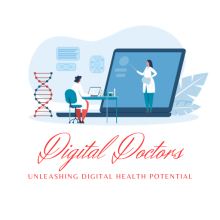Inspirational journeys
Follow the stories of academics and their research expeditions
Distinguishing Digital Medicine from Digital Health: Applications, Implications, and Case Studies

In the rapidly evolving landscape of healthcare technology,
the terms "digital medicine" and "digital health" are often
used interchangeably. However, a nuanced understanding of their distinctions is
crucial for navigating the complexities of modern healthcare. This article
delves into the differences between digital medicine and digital health,
providing detailed explanations, case studies, scenarios, and references to
elucidate their unique applications and implications.
Digital Health: Enhancing Healthcare Delivery and
Access Digital health encompasses a broad spectrum of technologies and
initiatives aimed at revolutionizing healthcare delivery, management, and
outcomes through the integration of digital tools and platforms (HIMSS, n.d.).
Examples of digital health solutions include electronic health records (EHRs),
telemedicine services, mobile health applications, wearable devices, and health
information systems. These technologies serve diverse purposes, such as
facilitating remote patient monitoring, enabling teleconsultations between
patients and healthcare providers, promoting health education and wellness, and
streamlining administrative processes in healthcare settings.
Case Study: Telemedicine in Rural Healthcare A
compelling example of digital health in action is the implementation of
telemedicine services in rural healthcare settings. For instance, a study
conducted by Dorsey et al. (2017) explored the impact of telemedicine interventions
for Parkinson's disease management in remote areas. The findings revealed that
telemedicine consultations led to improved patient outcomes, reduced travel
burden for patients, and decreased healthcare costs, demonstrating the
transformative potential of digital health technologies in expanding access to
specialized care.
Digital Medicine: Targeted Interventions for
Diagnosis and Treatment In contrast to the broad scope of digital health,
digital medicine refers to specialized technologies and applications
specifically designed for the diagnosis, treatment, and prevention of diseases
(Topol, 2019). Digital medicine interventions often leverage advanced
technologies such as artificial intelligence (AI), remote monitoring devices,
digital therapeutics, and sensor-based systems to deliver personalized,
precise, and data-driven healthcare solutions.
Case Study: Continuous Glucose Monitoring in Diabetes
Management An illustrative example of digital medicine in practice is the
continuous glucose monitoring (CGM) system developed by Abbott (Freestyle
Libre) for diabetes management. This FDA-approved device utilizes sensor
technology to provide real-time glucose readings for individuals with diabetes,
empowering them to monitor their blood sugar levels accurately and make
informed decisions about their treatment regimen (ADA, 2021). The integration
of digital medicine into diabetes care exemplifies how targeted interventions
can enhance disease management and improve patient outcomes.
Conclusion: In summary, digital medicine and digital
health represent distinct yet interconnected facets of healthcare technology,
each with its own set of applications, implications, and opportunities. While
digital health initiatives aim to enhance overall healthcare delivery and
accessibility, digital medicine focuses on leveraging specialized interventions
to diagnose, treat, and prevent diseases effectively. By understanding the
nuances between these two domains, healthcare stakeholders can harness the full
potential of technology to drive innovation, improve patient care, and advance
the future of medicine.
References:
Healthcare Information and Management Systems Society
(HIMSS). (n.d.). What is Digital Health? Retrieved from
https://www.himss.org/resources/what-digital-health
Dorsey, E. R., et al. (2017). Telemedicine for Parkinson's
Disease: A Randomized Controlled Trial. Neurology, 88(21), 2015–2022.
https://doi.org/10.1212/WNL.0000000000003880
Topol, E. J. (2019). The Topol Review: Preparing the
healthcare workforce to deliver the digital future. Health Education England.
Retrieved from https://topol.hee.nhs.uk/
American Diabetes Association (ADA). (2021). Continuous
Glucose Monitoring. Retrieved from
https://www.diabetes.org/diabetes/medication-management/blood-glucose-testing-and-control/continuous-glucose-monitoring
Tags:
digital medicine digital health healthcare technology telemedicine remote patient monitoring personalized medicine disease management case studies healthcare outcomes0 Comments
Categories
- Career Development and Opportunities in Digital Health 166
- White Papers 39
- IELTS For Medical Professional 35
- OET Exam Preparation 30
- Entrepreneurship and Innovation 26
- Healthcare Innovation 17





Leave a comment